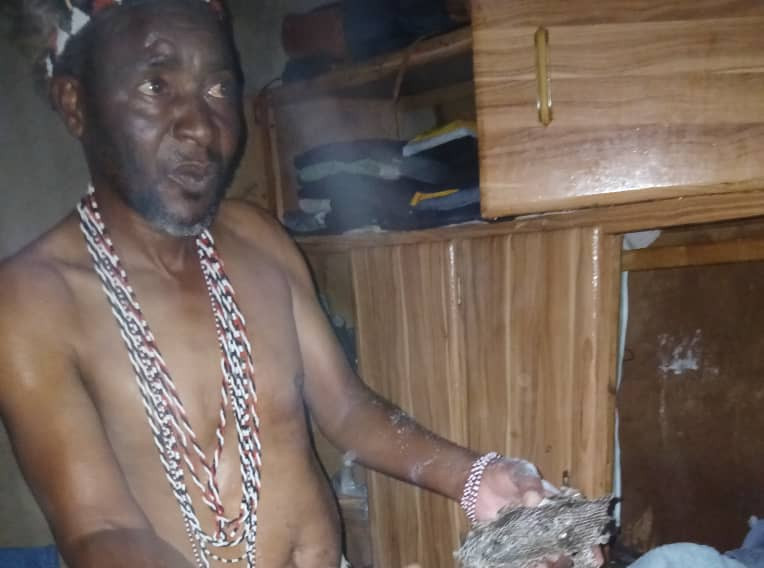
Music is powerful as it can propel a narrative swiftly forward or it can slow it down. Music is powerful as it can lift mere dialogue into the realm of poetry and forms of expression. Music and the power of sound is the communicating link between the musician and the audience reaching out and enveloping all into a singular experience.
As a musician, I have synergised with artists from different genres which encompass jazz, afro fusion, reggae, dancehall, hip hop, traditional music and maskandi among a few. When I was at the Chibuku road to fame provincial competitions, I had the priviledge of meeting up with Bhese Mpofu (pictured); an artist from Kezi who plays a unique music genre called “Tshova tshova”.
In hearing the sound of his music, it has a similarity and close connection with tshibilika and rhumba, which is commonly played in many areas of Matebeleland, though I usually align it with sungura.
“Tshova-tshova is music that tells the best stories, but in the process it uses the power of music to engage all senses. When we are vibing to the musical frequency the more senses that are stimulated, the more people will not only relate to the story but they are moved by it," Mpofu said.
“In doing this, the ultimate achievement is in people connecting to the message as an idea of their own rather than something that they heard. Tshova tshova is about movement and dancing to the sound and the rhythms in a palpitating pace which is like someone riding a bicycle.”
This response triggers me to think of music as an art form that is universally recognised for its mood altering qualities and its ability to affect behavior, because music activates emotion and memory.
“The musical backdrop creates a mood or atmosphere for the dance that will color how the audience sees and experiences it. The rhythm, or pattern of beats in the music, can influence the speed and phrasing of the movement hence the reason why we call it tshova tshova”.
Creative music such as the “tshova tshova” genre has to inspire feelings of movement in the listeners as this is a genre that evokes and propels mostly social dancing. When the audience hears the tones they move with them and experience the motion.
- In Full: Nineteenth post-cabinet press briefing: July 05, 2022
- UK tour big breakthrough for Feli Nandi
- Amuli now full-time traditional healer
- Bryn Mteki back on the music scene
Keep Reading
Mpofu said the name of his group is called Phikisani Super Sounds. In explaining the etymology of the band name he recounted his days when he was at Zamanyoni secondary school with his friends had decided to form a band and they debated over the possible names they could use.
The name “phikisani” means debate and hence this was a case in point that made Mpofu and his friends to end up calling the group Phikisani super sounds. Mpofu said in their group they are eight and he was the lead vocalist and guitarist.
“The songs that I sing with Phikisani super sounds are all about educating the masses and the wider community on different social issues and things that also personally happen to me. As an artist I am very observant of the different social dynamics which affect us in our everyday lives, and these are incidences and happenings that inspire me to compose music which I use to edutain the community. The truth is our music makes people dance and this is why we say tshova tshova”. Mpofu said.
As a group, Mpofu outlined how he had worked on a series of albums and projects with music that was premised on addressing of the different social issues. For example in the song “Sebe Cheater Bedeleter” he explains the issues that align with unfaithful relationships as many relationships and connections have been broken because of cell phones and how they lead to cheating.
The song addresses the issues of cheating and in the process showing how this is also a factor that contributes to the precedence of gender based violence.
In the song ama 2000, Mpofu and Phikisani Super Sounds critique the crop of youth who have become indulgent in the risky sexual practices. I like this song because it has a deep edutaining effect as it addresses the pressing issue of teen age pregnancies and early child marriages which leave many of them in a state of vulnerability. This also aligns with the risk of how the teenagers in the rural areas are in a great risk and vulnerability because of the lack of access to sexual reproductive health services.
Mpofu explained that, “Inketa betshabe is a song that speaks highly of discrimination which occurs within our communities. As we live in our different communities there are incidences when people discriminate and use concepts of social class and dynamics of power to be in a position of privilege. It is a song that addresses the poor development and marginalisation which remote and rural areas face”.
Phikisani Super Sounds in their music also address the issues of migration and the correlation with gender dynamics and family relations. For example in the song “isiwula sendoda” it speaks of irresponsible men who go to countries like South Africa where they forget about their families back home. This is a song that addresses the everyday realities of many men and families particularly in the context of Kezi; who migrate to South Africa in the search of greater opportunities.
“Our current social climate has seen the erosion of the aesthetics of our culture. In the tshova tshova music by Phikisani super sounds we seek to re instill a sense of cultural values. Globalisation has affected and diluted our culture and hence we have lost the sense of ubuntu. In one of our songs “umbane we zulu” we speak of the realities of the loss of the sense of culture especially among the youth. In this song we address a deep issue of how society no longer has respect for rain and it is of note that many of the children now play even if there is lightning and thunder. The many cultural taboos are now being broken,” Mpofu explained to Standard Style.
The challenges they faced as a band were with regards to funding and the viability of using music as a means of livelihood.
Mpofu explained how piracy was also another problem that is affecting many artists as their music can be shared through Whatsapp and listeners enjoy it with the musician seldom benefiting from the proceeds of the album and the musical project.
“It is why we are based in both Zimbabwe and South Africa because we have a following in both countries and this increases the potential of us having a wider audience which can help us have more revenue.”
An artist that cannot define his unique attributes will have a very hard time communicating his brand to his audience and the industry. Building a brand like the case of Phikisani Super Sounds relies in having a truly unique artistic personality which is expressed in the artist’s music, look and performance.
Only you experience the world through your eyes; only you can share that exact experience on your canvas. Being a bold artist requires more than technical skill, more than a specific color palette. It takes the courage to put your personal vision out into the world.
Finally as musicians there is a need to reflect on our personal story, family background, and life events that shaped our perspective, as well as the emotions they evoke. Think about how these experiences help shape your music, and in turn, how you can funnel them into a unique and authentic artistic persona.
*Raymond Millagre Langa is musician, poet, orator, independent researcher and founder of Indebo edutainment Trust. You can follow on Facebook @Millagre Ray Langa, on X you can follow on #Millagre Langa, email. millagrepapito@gmail.com or indebotrust@gmail.com










